Rolling along
our hobo legacy
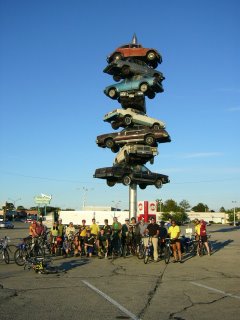 One thing you'll notice about the bike community in the City of Big Shoulders is diversity. There are hipster beaterbikes, yuppie spandex-wrapped weekend warriors, Latino ice cream vendors, WASPy commuters, freakbikers, teenage BMXers, and more. Although I haven't seen many South Asians, the streets are a celebration of multi-cultural Chicago.
One thing you'll notice about the bike community in the City of Big Shoulders is diversity. There are hipster beaterbikes, yuppie spandex-wrapped weekend warriors, Latino ice cream vendors, WASPy commuters, freakbikers, teenage BMXers, and more. Although I haven't seen many South Asians, the streets are a celebration of multi-cultural Chicago. One group I've begun to notice is what I call The Rollers. They rock! They bike for the sheer joy of the ride, everyday in every kind of weather. Rollers are consummate foxes; or even cats, since they know and do a lot of little things about bikes. You might first think their shared passion for bikes qualifies them as hedgehogs. But the diversity of the bikes themselves as well as values and ideologies is so vast that a hedgehog could never accommodate it all with one big idea.
One group I've begun to notice is what I call The Rollers. They rock! They bike for the sheer joy of the ride, everyday in every kind of weather. Rollers are consummate foxes; or even cats, since they know and do a lot of little things about bikes. You might first think their shared passion for bikes qualifies them as hedgehogs. But the diversity of the bikes themselves as well as values and ideologies is so vast that a hedgehog could never accommodate it all with one big idea.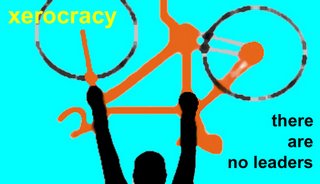 So rollers aren't necessarily anarchists, unless they want to be. If that label is incorrectly applied by motorists and government authorities, it's because rollers flourish on the edges of American society. Their very existence poses a threat to middle class conformity and this seems to really irritate some motorists.
So rollers aren't necessarily anarchists, unless they want to be. If that label is incorrectly applied by motorists and government authorities, it's because rollers flourish on the edges of American society. Their very existence poses a threat to middle class conformity and this seems to really irritate some motorists.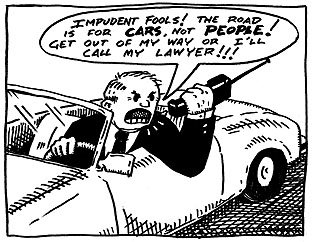 I've had a number of run-ins with motorists who have shouted insults at me as I rolled along ... LEGALLY. Each time I got the distinct impression that I had gravely wounded their sense of middle class propriety. That I might have rolling rights as a legally recognized slow-moving vehicle didn't seem to enter their minds. They either saw me as a big kid on a toy endangering the streets or selfish hobbiest with more time for leisure pursuits than the harried motorists going to work or shuttling the kids to their doctor appointments.
I've had a number of run-ins with motorists who have shouted insults at me as I rolled along ... LEGALLY. Each time I got the distinct impression that I had gravely wounded their sense of middle class propriety. That I might have rolling rights as a legally recognized slow-moving vehicle didn't seem to enter their minds. They either saw me as a big kid on a toy endangering the streets or selfish hobbiest with more time for leisure pursuits than the harried motorists going to work or shuttling the kids to their doctor appointments.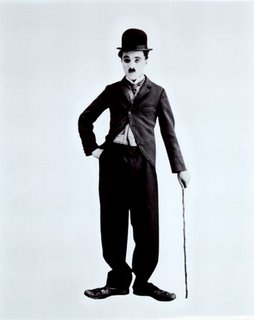 Such thinking isn't all that surprising. In many ways, rolling against middle class conventions is an old, if odd, American tradition. Rollers are the grandsons and granddaughters of the tramps, loafers, and what the French called flaneurs. They're the sons and daughters of hobos, travellers, vagabonds, and backpackers. They're essentially slackers on two wheels. As such they draw the unwelcome attention of police and politicians as much as did their peculiar ancestors.
Such thinking isn't all that surprising. In many ways, rolling against middle class conventions is an old, if odd, American tradition. Rollers are the grandsons and granddaughters of the tramps, loafers, and what the French called flaneurs. They're the sons and daughters of hobos, travellers, vagabonds, and backpackers. They're essentially slackers on two wheels. As such they draw the unwelcome attention of police and politicians as much as did their peculiar ancestors.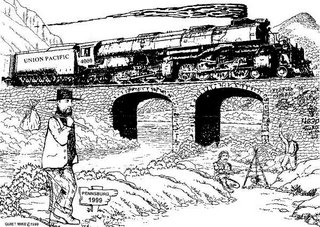 When the Depression of 1893 threw millions of men and women out of work they hit the roads. State legislatures, as well as business leaders, around the US reacted with horror and enacted highly stringent laws against these tramps. In a surprising response, Governor L. D. Lewelling defended their rights against arbitrary arrest by local police. His Tramp Circular is not only a astonishing reminder of a time when Kansas was progressive but a wonderful statement of why today we have the right to roll along.
When the Depression of 1893 threw millions of men and women out of work they hit the roads. State legislatures, as well as business leaders, around the US reacted with horror and enacted highly stringent laws against these tramps. In a surprising response, Governor L. D. Lewelling defended their rights against arbitrary arrest by local police. His Tramp Circular is not only a astonishing reminder of a time when Kansas was progressive but a wonderful statement of why today we have the right to roll along.The right to go freely from place to place ... in obedience of a mere whim, is part of that personal liberty guaranteed by the Constitution of the United States to every human being on American soil. If voluntary idleness is not forbidden; if a Diogenes prefer poverty; if a Columbus choose hunger and the discovery of a new race, rather than seek personal comfort by engaging in “some legitimate business,” I am aware of no power in the legislature or in city councils to deny; him the right to seek happiness in his own way, so long as he harms no other, rich or poor; but let simple poverty cease to be a crime.
 Not that I'm all that comfortable with labeling rollers, Slackers on Two Wheels. In the wrong mouths, labels can be dangerous. If you think that mere words can't harm, remember that J. Edgar Hoover threw stick and stones at the bones of the rollers' ancestors. During WWI, he was a special agent for the newly formed FBI in charge of Slacker Raids. Agents and civilian vigilantes rounded up foreigners, conscientious objectors, left-leaning idealists, and other outsiders for indefinite detention. Although some were certainly spies and draft-dodgers, most were simply expressing their rights to roll against war hysteria.
Not that I'm all that comfortable with labeling rollers, Slackers on Two Wheels. In the wrong mouths, labels can be dangerous. If you think that mere words can't harm, remember that J. Edgar Hoover threw stick and stones at the bones of the rollers' ancestors. During WWI, he was a special agent for the newly formed FBI in charge of Slacker Raids. Agents and civilian vigilantes rounded up foreigners, conscientious objectors, left-leaning idealists, and other outsiders for indefinite detention. Although some were certainly spies and draft-dodgers, most were simply expressing their rights to roll against war hysteria.Today, rollers, whatever their particular values or ideologies, continue to ride for the right to seek happiness in their own way.
Labels: Chicago, Isaiah Berlin, velotariat

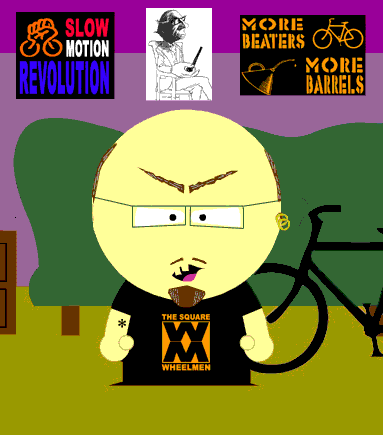





0 Comments:
Post a Comment
<< Home